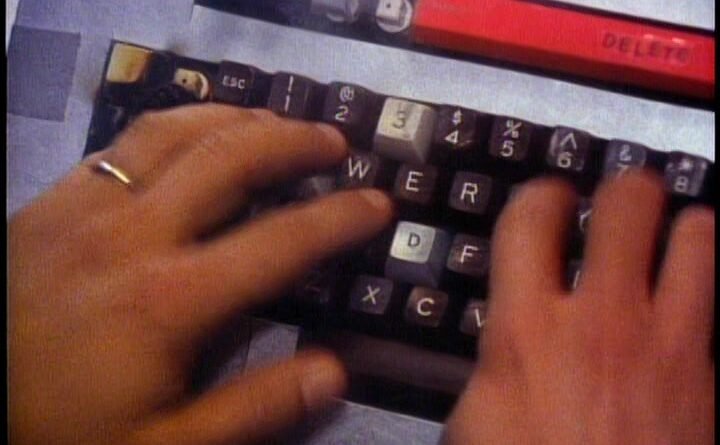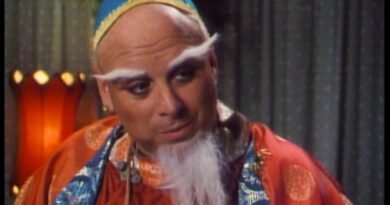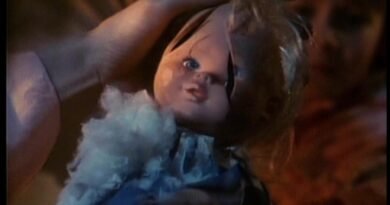Tales from the Darkside: “The Word Processor of the Gods” (S1E08)

The Word Processor of the Gods is one of the more emotionally resonant and conceptually clever episodes in the Tales from the Darkside anthology. Based on a short story by Stephen King, this entry blends speculative fiction with a quiet, simmering sadness that gradually transforms into cathartic wish fulfilment. It’s not horror in the traditional sense, but it taps into deeply human fears: loss, regret, and the longing to rewrite one’s life.
Plot Summary
Richard Hagstrom is a struggling writer and high school teacher with a life that feels like a series of disappointments. He has an emotionally distant (and borderline abusive) wife, a cruel teenage son, and very little joy left in his day-to-day existence.
After the tragic death of his beloved nephew Jonathan and his sister-in-law, Richard receives a bizarre gift: a homemade word processor assembled by Jonathan before his death. When Richard begins using the machine, he discovers that whatever he types into it becomes real. He can delete objects, create money, or change facts in the world—with just a keystroke.
As he tests the machine’s capabilities, Richard realises the full implications: he can rewrite his own life. And that’s exactly what he does. He deletes his cruel son, erases his unhappy marriage, and ultimately recreates a new world where Jonathan is his own son and his late sister-in-law is his new, loving wife.
In the final scene, the machine short-circuits just as Richard finishes typing his new life into existence. He turns around to find everything changed. His office is clean, his new son (Jonathan) is happily practising music, and his wife greets him warmly. It’s a happy ending—and a dark one, depending on how you look at it.
What Works
Emotional Core
Unlike many Darkside episodes that lean heavily into horror, The Word Processor of the Gods succeeds on the strength of its emotional through-line. Richard’s life is painful to watch, but it makes his yearning for something better deeply sympathetic. His transformation isn’t motivated by greed or power, but by sorrow and missed opportunity.
A Great Central Performance
Bruce Davison does a fantastic job portraying Richard. He exudes quiet desperation, and his subtle reactions as he realises the machine’s power are pitch-perfect. He makes a potentially ludicrous premise feel grounded and believable.
Simple but Powerful Concept
The idea of a word processor that can alter reality is brilliant in its simplicity. It’s a metaphor for the writer’s god-like power, but also a literal plot device that offers real, tangible stakes. It’s a high-concept idea handled in a very human, intimate way.
Faithful to Stephen King’s Style
This episode captures the essence of King’s storytelling: ordinary people in extraordinary situations, moral ambiguity, and a healthy dose of dark irony. It doesn’t rely on gore or monsters, but instead digs into the horror of real life and the fantasy of rewriting it.
What Doesn’t Work
Low Budget Look
As with many Darkside episodes, the production value is modest. The word processor itself looks like a slapped-together piece of junk tech, which, while explained as being homemade, still might stretch believability for some viewers.
The Son and Wife Are Cartoonishly Horrible
Richard’s original family is so over-the-top in their nastiness that they border on caricature. His son is a mean-spirited slob and his wife is relentlessly unpleasant. This makes the audience root for Richard, but it also flattens the characters into one-note villains rather than complex human beings.
Ethical Ambiguity Left Unexplored
While the episode frames Richard’s rewrite as a happy ending, there’s an underlying ethical question: is it right to delete people from existence, even awful ones? The episode doesn’t dwell on this, choosing instead to focus on the emotional payoff. For some viewers, this lack of introspection might feel like a missed opportunity.
Themes: Wish Fulfilment, Loss, and the Power of Words
This episode is a writer’s fantasy in the most literal sense. The power to write reality is the ultimate expression of control, and here it’s tied directly to grief and longing. Richard doesn’t want fame or fortune—he wants a second chance at love and family.
There’s also something subtly tragic in the fact that this chance only comes after a young boy dies. The story flirts with the idea that the machine is a kind of posthumous gift, giving Richard what he and Jonathan both might have wanted all along.
Final Thoughts: A Bittersweet Fable With Teeth
The Word Processor of the Gods stands out among Tales from the Darkside episodes because it trades on emotion rather than jump scares. It’s a character-driven story that blends sci-fi, drama, and a touch of horror in a surprisingly thoughtful way. Its small budget and some shallow characterisations hold it back a little, but the strength of its concept and performance make it memorable.
It poses a chilling question in the sweetest possible way: if you had the power to change your life, what would you erase?
Who Would Enjoy This Episode?
- Fans of Stephen King’s more introspective work
- Viewers who like speculative fiction with emotional stakes
- Writers and creatives drawn to stories about reality and control
Who Might Not Enjoy It?
- Viewers expecting traditional horror or monster thrills
- Those put off by low production value or dated tech
- Audiences uncomfortable with ethically grey happy endings
Final Verdict: A Wish Granted, at a Cost
Emotionally grounded and conceptually sharp, The Word Processor of the Gods is one of Tales from the Darkside’s most thoughtful and quietly haunting episodes. It may be wrapped in retro visuals, but the ideas at its heart still feel eerily relevant today.




